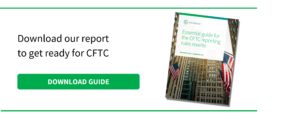
DTCC proposes withdrawal of FpML support for North America trade reporting – how does this impact your CFTC/SEC reporting?
Many firms are in the midst of preparations for the CFTC rewrite due to go live in May 2022, the first significant change since the reporting rules went live in 2013. The reporting rules rewrite brings with it several challenges including the introduction of collateral reporting, new data fields, timing changes on part 45 and new verification requirements, just to name a few.
To add to the complexity, DTCC, the largest Trade Repository in North America, is proposing that it would no longer support FpML from May 2022 for its North America trade reporting and is moving to their proprietary Harmonized XML and Harmonized CSV format. This decision could force many firms to have to significantly adjust their planned CFTC implementation projects.
What is FpML and why is it important?
For a good part of two decades, FpML has been the “lingua franca” for OTC derivatives post-trade, including trade processing and trade capture, and most recently regulatory trade reporting. It is used today by the largest financial institutions for post-trade, clearing and reporting around the world, and certainly in the U.S.
The FpML Regulatory Reporting Working Group has been analysing the CFTC rules rewrite and plans to make changes in the latest FpML version, but it was not anticipated that FpML would potentially no longer be supported by the Trade Repository. Due to the complexity of the CFTC rewrite however, the suggestion is that XML or CSV may be a better data format for capturing all of the nuances for trade reporting purposes. However, firms may continue to use it for internal purposes.
The CFTC rules mentioned that ISO 20022 would be the standard going forward, but from the onset of the rules being published, it seemed unlikely that the ISO 20022 CFTC schema would be ready in time for the rewrite.
The proposal as it stands, although still being discussed with the industry is to only support their harmonized XML and CSV for North American (CFTC, SEC SBSR and Canada). Not only is the industry potentially forced now to change from FPML, there is another change coming down the line with ISO 20022, whenever it becomes available in the U.S. The industry will need to go through two major transitions: 1. FpML to DTCC XML and 2. DTCC XML to ISO 20022
For most firms, the CFTC rewrite was complex enough just being able to comply with the changes in the regulation and the new technical standards, but would introduce another layer altogether.
Some firms may be wondering what the big deal is, but the format changing is not a simple undertaking. The entire OTC derivatives ecosystem has been built around FpML. Market infrastructure providers such as SEFs, DCMs, DCOs and confirmation platforms all rely on FpML today for their trade reporting. Even more problematic is that most clients relying on third-party providers for trade capture, risk, processing, execution, etc. will still continue to receive data in FpML for the foreseeable future as these upstream workflows require the richer data format and inter-operability that FpML provides.
How can you solve this challenge in such a short time?
Option 1:
Bite the bullet and move all reporting in N.A. to DTCC XML for the May 2022 deadline. This would be a massive undertaking that would require the remapping and translation of any systems that use FpML today.
Would all vendors make the changes in unison to coincide with May 2022 implementation date? Even if this was the case, it would take tremendous resources and would significantly impact their 2021 roadmap.
Option 2:
Move to harmonized CSV. Again, this would require the re-mapping of all data from FpML to CSV. The critical issue here is that CSV is only processed in batches by DTCC. This would create further challenges in meeting the Real Time/As Soon as Technologically Practicable “ASATP” requirements. Utilizing CSV also presents challenges in being able to describe and report complex trades, such as options and multi-leg swaps.
Option 3:
Continue using FpML and leverage a third-party reporting provider to convert the FpML messages to the DTCC XML. By letting someone else do the mapping, firms will save hundreds of thousands of dollars on this project, but more importantly, it would also help insulate them from the later migration to ISO 20022. Having that translation layer for reporting ensures that any changes to the Trade Repository (decommissioning of services, removing license, changing data formats, etc.) are not impacting any business and compliance timelines.
2020 and 2021 have brought in significant changes to the regulatory trade reporting industry around the world with the shutdown of several trade repositories and now a substantial change to data formats in the U.S. Every firm needs to assess how they can best prepare for any future changes and assess whether their current solutions are fit for purpose.
IHS Markit recently published a “Buy vs Build” article that discusses some of the considerations firms should have around regulatory reporting solutions that is even more relevant following this announcement.
The North American data format changes are 12 months away, but the time is now to start thinking about options on how to best solve.
If you are looking for help navigating the format changes discussed in this blog and/or helping to ensure your firm is ready for the May 2022 CFTC rewrite implementation date, contact us here







